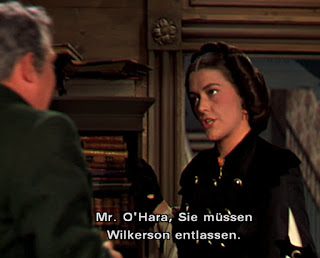 Like most European languages, German has two forms of "you"; a polite one (Sie) and an informal one (du). The choice of which one to use is complicated and subtle, and usage has shifted over time and geography. You have to be raised with it to do it right. The discussion of it on the Wikipedia is HERE.
Like most European languages, German has two forms of "you"; a polite one (Sie) and an informal one (du). The choice of which one to use is complicated and subtle, and usage has shifted over time and geography. You have to be raised with it to do it right. The discussion of it on the Wikipedia is HERE.
At Dussmann's bookstore in Berlin, I bought a DVD of the German-dubbed version of "Gone With the Wind." The movie was released just as WWII was ramping up, so the German version didn't come out until afterward, in 1953.
The movie is a fun illustration of du/Sie ambiguities. Not only is the plot full of social class differences, but it takes place 150 years ago in a feudal society . The dubbers and subtitlers had to make du/Sie choices all through the movie, because of course the English language screenplay has no such distinctions.
Naturally, the slaves always address their white owners in the polite form, even when they are barking commands at them, like old Mammy does to bratty Scarlett in the above shot.

When gushing, adoring, nerdy Charles Hamilton proposes to Miss Scarlett, it's all Sie-Sie-Sie up to the moment that she absent-mindedly tells him yes -- then it's immediately all du-du-du.
But the dubbers' ideas for du/Sie were different from the people who wrote the subtitles. In the subtitles (and in the novel), Scarlett's parents call each other "Mr. O'Hara" and "Mrs. O'Hara" even in private conversations, even though they presumably sleep in the same bed (they have 3 daughters). So in the subtitles they use the polite "Sie". But in the dubbed soundtrack, they are on a first-name basis and call one another "du".

In this scene, on the soundtrack the wife says, "Mein lieber Gerald, du musst den Wilkerson wegschicken" (My dear Gerald, you must send that Wilkerson away). But in the subtitle she says, "Mr. O'Hara, you [polite] must dismiss Wilkerson."
No comments:
Post a Comment